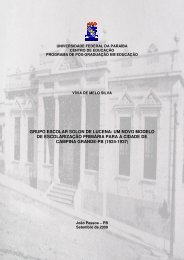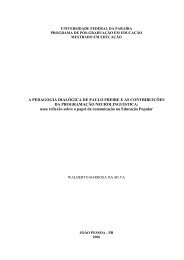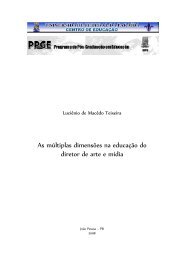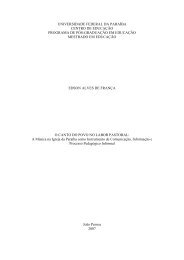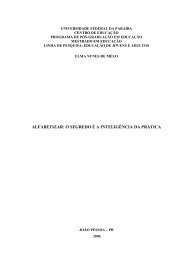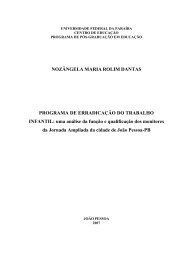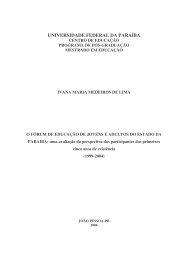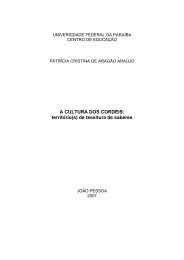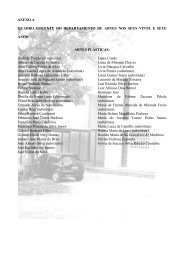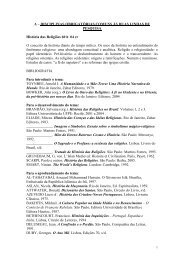biografias de aprendizagens de mulheres encarceradas - Centro de ...
biografias de aprendizagens de mulheres encarceradas - Centro de ...
biografias de aprendizagens de mulheres encarceradas - Centro de ...
You also want an ePaper? Increase the reach of your titles
YUMPU automatically turns print PDFs into web optimized ePapers that Google loves.
ABSTRACT<br />
The following work analyzes the learning processes of the women incarcerated in the Institute<br />
of Female Recovering Júlia Maranhão of João Pessoa - PB. We have specifically searched to<br />
learn how this knowledge was (and is being) learned in the course of their lives. To this<br />
purpose, we adopted the biographic focus as presented in the biogrificidad concept of Alheit<br />
and Dausien (1996, 2000, 2007). This theoretical-methodological concept analyzes in both<br />
theory and practices the learning processes and formation of the individual biographies insi<strong>de</strong><br />
the subject's social contexts. Following these premises, the objective of this study was<br />
established as: to un<strong>de</strong>rstand the relation between the knowledge learned by the incarcerated<br />
women and the motives that led them to crime. The methodological procedures were specially<br />
adapted to the work's objective and subjects of study. Therefore, we used the biographic<br />
method and associated techniques, such as the subjects' life stories and <strong>de</strong>pth interview. We<br />
have also used quantitative instruments of research to support the qualitative/biographic<br />
analysis. The data classification was organized in three categories (biography and family,<br />
biography and workplace, biography and school/education), which are linked to the<br />
theoretical proposal of biograficidad. The interviews analyses were conducted consi<strong>de</strong>ring the<br />
biographic courses of the inmates, the major domains of their lives: family, work and<br />
education. The data interpretation allowed us to better <strong>de</strong>fine the major marks in their<br />
biographies: the different phases of life (building up a family, exercising a profession and<br />
education), the ruptures and transitions. Most presented dramatic stories, <strong>de</strong>rived from the<br />
absence of a solid familiar reference, child labor and the precarious beginning in the work life,<br />
besi<strong>de</strong>s bad experiences at the schooling process. All of them were linked to a criminal<br />
trajectory which encompasses their biographies. The data also reveals these women's<br />
capability when it comes to <strong>de</strong>veloping new <strong>de</strong>signs of biographical structures. Their attempts<br />
to affirm themselves as subjects were also a frequent topic in their narratives.<br />
Keywords: Biography, learning, life experience, biograficidad.



